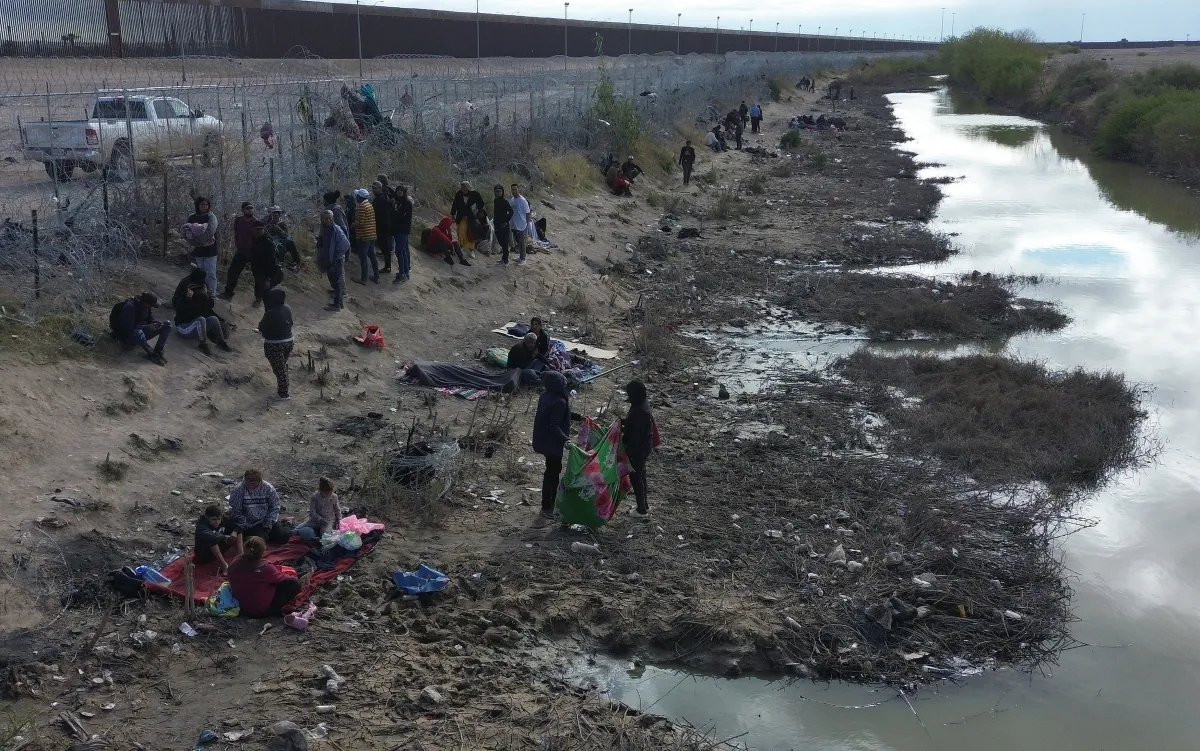International
Keys to the anti-immigrant law of Texas and states that follow its example

The Texas SB-4 law, considered one of the most drastic anti-immigrant measures in the history of the United States along with the SB-1070 of Arizona of 2010, has raised the tension in the border area of the United States and Mexico and has inspired other states of Republican governments to follow in its footsteps.
In the midst of the complicated legal battle between the state and federal governments, which prevented this measure from entering into force on March 5, uncertainty grows among undocumented immigrants, and also legal immigrants, because it lends itself to racial discrimination.
The measure, promoted by the governor of Texas, Republican Greg Abbott, makes it a misdemeanor that a foreigner “enters or attempts to enter the state from a foreign nation” irregularly. The detained migrant will be accused of a misdemeanor, which carries a penalty of up to six months in prison.
If the offender is a repeat offender, the offense becomes a serious crime, punishable by up to 20 years in prison.
The law allows the state Justice (different from immigration judges) to order the expulsion of the foreigner without legal process. A judge could withdraw the charges if the migrant agrees to return to Mexico.
SB-4 also prohibits any local policy that restricts police officers from questioning a person’s immigration status, even during routine arrests such as at traffic stops, which are promoted in the so-called “immigrant sanctuaries.”
The measure requires local authorities to allocate resources such as prison space, agents and funds to implement the law.
The initiative prohibits the police from arresting immigrants in public or private schools, churches and other places of worship, and medical centers. However, it does not mention university campuses.
-Iowa: The House of Representatives of that state approved a bill on Tuesday. It would allow the police to arrest certain undocumented immigrants and order them to leave the country.
Undocumented immigrants could face up to two years in prison if they enter, attempt to enter or are found in Iowa, after they were denied entry to the United States or had been deported.
The measure is addressed to the desk of Governor Kim Reynolds, who has given her support to the legislation.
– New Hampshire: The Senate of that state approved at the beginning of the month a bill that allows the police to file charges of invasion of private property against people suspected of having illegally entered the United States from Canada. The initiative is currently being discussed in the House of Representatives of that state.
– Tennessee: Last Friday, lawmakers from the Lower House of Tennessee approved a bill that requires police officers to report to the Department of Homeland Security (DHS) that they have come across an undocumented person.
– Georgia, Florida, Louisiana and North Carolina: The legislatures of these states have approved or are discussing bills similar to Texan law. They impose harsh sanctions on the undocumented under the argument that they must act to contain the arrival of migrants.
– Arizona: The governor of that state, Democrat Katie Hobbs, has a measure on her table, dubbed the Arizona Invasion Law. It would criminalize immigrants by authorizing police departments to arrest and arrest foreigners who cross the border illegally.
This project, promoted by the Republicans and expected to veto Hobbs, would also grant immunity to the police and their departments from any legal action against them due to possible incidents that occurred while the law is being applied.
International
Trump Floats “Friendly Takeover” of Cuba Amid Rising Tensions

U.S. President Donald Trump said Friday that his administration is considering what he described as a “friendly takeover” of Cuba, as Washington continues to increase pressure on the island’s communist government.
“The Cuban government is talking to us and they have very serious problems, as you know. They have no money, they have nothing at this moment, but they are talking to us and maybe we will see a friendly takeover of Cuba,” Trump told reporters as he departed the White House for a trip to Texas.
Earlier in the week, U.S. Secretary of State Marco Rubio said Cuba needed a “radical change,” shortly after Washington eased restrictions on oil exports to the island for what officials described as “humanitarian reasons,” amid a deep economic crisis.
The United States has imposed an energy blockade on Cuba since January, citing what it calls an “extraordinary threat” posed by the communist-run island, located roughly 150 kilometers (90 miles) off the coast of Florida, to U.S. national security.
International
Argentina’s Senate Reviews Milei-Backed Labor Overhaul

Argentina’s Senate on Friday began reviewing the Labor Modernization Law promoted by the administration of President Javier Milei, a proposal that would significantly reshape labor rules across the country.
The upper chamber opened its final discussion of the contentious initiative, which revises the method used to calculate severance payments — lowering the amounts owed in dismissal cases — and introduces an “hour bank” mechanism that allows overtime to be offset with paid leave rather than extra wages.
The legislation also broadens the classification of essential services, a change that would place new limits on the right to strike in designated sectors.
The bill was initially approved by the Senate on February 11 and then moved to the Chamber of Deputies, where lawmakers passed it with amendments. It has now returned to the Senate for definitive approval.
Outside the Congress building in Buenos Aires, workers, trade unions and left-wing organizations staged demonstrations beginning at midday. The gathering later thinned out amid reports of disturbances and a strong police presence. Security forces had secured the area surrounding the legislature since early morning hours.
Union leaders contend that the reform weakens labor protections, while many business representatives back the measure but stress that sustainable formal employment will require economic expansion, improved credit conditions, greater investment and a more dynamic domestic market.
International
Federal Judge Blocks Trump Policy Allowing Deportations to Third Countries

A federal judge ruled on Wednesday that the policy of U.S. President Donald Trump’s administration allowing immigration authorities to deport foreign nationals to third countries without prior notice or the opportunity to object is unlawful. The decision marks another legal setback for the administration on immigration matters.
Judge Brian Murphy of the U.S. District Court for the District of Massachusetts struck down the regulation issued last year, which stated that Immigration and Customs Enforcement (ICE) was not required to notify migrants if they were to be sent to countries other than the one listed in their removal order, provided that receiving nations offered assurances they would not face persecution or torture.
Murphy ordered the measure vacated but granted a 15-day delay before the ruling takes effect, giving the Trump administration time to file an appeal.
In his decision, the judge concluded that the policy violates federal immigration law and migrants’ due process rights. He also questioned the lack of transparency surrounding the alleged assurances provided by receiving countries, stating that “no one really knows anything about these supposed ‘assurances.’” He added, “It is not right, and it is not lawful.”
The ruling follows several legal disputes involving deportations to third countries. Last year, the executive branch deported more than 200 Salvadorans to a maximum-security prison in El Salvador, invoking an old wartime law. The White House also held talks with Costa Rica, Panama, and Rwanda about receiving migrants who are not citizens of those countries.
In May, the same judge determined that the government violated a court order when it attempted to remove a group of immigrants with criminal records to South Sudan without prior notice or an opportunity to raise claims of fear of persecution.
Although President Donald Trump took the case to the U.S. Supreme Court, which temporarily allowed the deportations to resume while a final decision was pending, the White House is expected to again appeal to higher courts to overturn this latest judicial ruling.
-

 International2 days ago
International2 days agoFamily of “El Mencho” Seeks Return of Body After Deadly Military Operation
-

 International2 days ago
International2 days agoLarry Summers Steps Down from Harvard Role Amid Epstein Controversy
-

 International2 days ago
International2 days agoIran’s President Optimistic Ahead of Geneva Nuclear Talks with U.S.
-

 International2 days ago
International2 days agoBill Gates Admits “Serious Mistake” Over Epstein Ties
-

 International2 days ago
International2 days agoStephen Hawking Photo Appears in Newly Released Epstein Documents
-

 International4 days ago
International4 days agoOver 40 Million Affected by Major Snowstorm in Northeastern U.S.
-

 International1 day ago
International1 day agoCocaine Production Surges 34% in 2023 as Market Expands into Africa and Asia
-

 International4 days ago
International4 days agoNine People Killed in Two Armed Attacks in Manabí, Ecuador
-

 International1 day ago
International1 day agoFederal Judge Blocks Trump Policy Allowing Deportations to Third Countries
-

 International1 day ago
International1 day agoClinton Accuses Republican Committee of Using Epstein Case to Shield Trump
-

 International7 hours ago
International7 hours agoArgentina’s Senate Reviews Milei-Backed Labor Overhaul
-

 International7 hours ago
International7 hours agoTrump Floats “Friendly Takeover” of Cuba Amid Rising Tensions
































